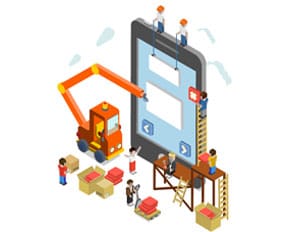The Future of Mobile App Development: User Experience, Trends and Technologies

The Future of Mobile App Development: User Experience, Trends and Technologies
Introduction
Mobile app development leads the way in innovation in a quickly changing digital environment by constantly adjusting to satisfy users’ shifting requirements and expectations. This essay examines the ever-changing field of mobile app development, looking at new developments in technology, fashion, and user experience.
Technological improvements and changing user expectations are causing a rapid transition in the mobile app development landscape. The need for creative and captivating mobile applications is only going to increase as smartphones become more and more ingrained in our everyday lives. Future mobile app development is being shaped by this dynamic environment, where user experience is prioritized and the boundaries of what is possible are being redefined by new trends and cutting-edge technologies. This blog will examine the major developments in user experience, technology, and trends that will influence mobile app development going forward. It will also offer advice on how companies and developers can keep a step ahead in this rapidly evolving field.
The Growth of Cross-Platform Development
Cross-platform development has become a game-changer in today’s competitive landscape, allowing developers to create programs that function flawlessly across a variety of operating systems. By utilizing frameworks such as React Native and Flutter, developers can reduce time-to-market and development expenses by writing code only once and deploying it across both iOS and Android platforms.
The demand for high-performance, economical, and effective app development solutions is fueling the rise of cross-platform development. The future of developing mobile and online applications is expected to require cross-platform development even more due to ongoing advancements in frameworks, tools, and community support.
Cloud-Native Applications: Increasing Flexibility and Scalability
Cloud-native app development is becoming more and more popular, giving developers the ability to create apps that are flexible, scalable, and resilient by nature. AWS, Azure, and Google Cloud Platform are just a few examples of cloud services that developers can use to leverage dispersed processing capacity and ensure optimal performance and stability for their apps.
Integrating AR and VR to Change the User Experience
The way people interact with smartphone apps is being revolutionized by augmented reality (AR) and virtual reality (VR) technologies, which produce captivating and immersive experiences. The combination of AR and VR technology has the potential to significantly increase user engagement and drive conversions in a variety of applications, including interactive gaming and virtual try-on experiences in e-commerce platforms.
With the possibility of integrating AR and VR, the future of mobile app development appears bright. With their immersive, personalized, and interactive interactions, these technologies have the potential to completely transform user experiences and capture and engage consumers in previously unheard-of ways. Businesses and developers who adopt AR and VR will lead this exciting transformation, providing cutting-edge apps to satisfy the increasing need for unique and immersive user experiences.
5G Technology: Transforming Communication
With lightning-fast speeds and extremely low latency, 5G technology is expected to bring in a new era of communication. Mobile app developers now have the chance to take advantage of the growing number of 5G-enabled devices by using this technology to create high-bandwidth, low-latency experiences, such as augmented reality apps and real-time gaming.
Internet of Things (IoT) Integration:
The mobile app market is changing as a result of the Internet of Things (IoT), which makes it possible for apps to integrate seamlessly with wearable technology and smart home appliances alike. Developers may produce cutting-edge apps that automate processes, provide personalized experiences, and boost productivity across a range of industries, such as transportation, agriculture, and healthcare, by utilizing IoT technologies.
Voice-Activated Interfaces: A New Definition of Communication
The way users engage with mobile apps is changing due to voice-activated interfaces backed by technologies like machine learning and natural language processing (NLP). Voice-enabled interfaces, which range from virtual assistants to voice-controlled apps, provide a hands-free and simple user experience that encourages increased adoption across a variety of demographics.
App Security: Making Data Protection a Top Priority
App developers need to provide strong security measures top priority to protect sensitive data, as consumers’ concerns over data privacy and security are growing increasingly pressing. To establish confidence and trust, user data security must be guaranteed by putting industry best practices for safe coding into effect and adopting end-to-end encryption.
Progressive Web Applications (PWAs): Creating Connections
In terms of performance, dependability, and user experience, Progressive online Apps (PWAs) offer the best of both worlds. They are the result of the convergence of online and mobile app technology. PWAs blur the boundaries between native and web apps by utilizing service workers and web app manifest files to offer offline access, push notifications, and quick load times.
The Role of Artificial Intelligence (AI) in App Development:
The use of artificial intelligence (AI) in mobile app development is becoming more commonplace, allowing programmers to give customers better, more customized experiences. AI-powered features are improving user engagement and generating commercial outcomes across a variety of applications, including chatbots, virtual assistants, recommendation engines, and predictive analytics.
Principles of User-Centric Design:
Successful mobile app development relies heavily on user-centric design concepts, which guarantee that apps are easy to use, accessible, and fun. Developers can create apps that resonate with their target audience and provide excellent user experiences by giving priority to user research, feedback-driven design revisions, and iterative testing.
Wearable Technology’s Future:
With the potential to create immersive augmented reality applications, individualized health and fitness experiences, and seamless connection with Internet of Things devices, wearable technology is set to completely transform the mobile app market. To fully utilize wearable technology, developers will need to think beyond the box as these gadgets get more advanced and less expensive.
Gamification in Mobile Apps:
Using game-like features like points, badges, and leaderboards to incentivize users and encourage desirable behaviors, gamification is a potent tactic for improving user engagement and retention in mobile apps. Gamification has great promise for producing immersive and captivating experiences, from fitness applications that incentivize users to reach fitness objectives to language-learning applications that gamify the learning process.
Personalized User Experiences:
Delivering relevant and meaningful experiences that users connect with requires personalization. By leveraging user data and machine learning algorithms, developers can create personalized experiences that cater to individual preferences, behaviors, and context, driving increased engagement, loyalty, and satisfaction.
Techniques for Monetizing Apps:
For mobile app developers hoping to make money and grow their companies, monetizing their apps is essential. The monetization options available to developers are diverse and each has advantages and disadvantages of its own. These strategies range from in-app advertising and freemium models to subscription-based services and in-app purchases.
Frequently Asked Questions or FAQs
- What benefits do frameworks for cross-platform programming offer?
By allowing developers to create code only once and publish it across various platforms, cross-platform development frameworks such as React Native and Flutter streamline the development process and save time-to-market and development expenses.
- How does AI fit into the process of creating mobile apps?
Mobile apps become more intelligent, intuitive, and user-focused with the use of artificial intelligence, which powers features like natural language processing, predictive analytics, and personalized suggestions.
- What possibilities does blockchain technology have for creating mobile applications?
Blockchain technology prioritizes privacy and transparency in mobile apps by providing decentralized solutions for digital identity verification, safe transactions, and decentralized applications (DApps).
- How is the world of smartphone apps changing as a result of augmented reality?
The boundaries between the actual and virtual worlds are blurred by augmented reality, which provides immersive experiences that transform mobile device interaction for users—from gaming to shopping.
Thank You!
Keep Learning! Keep Coding!



